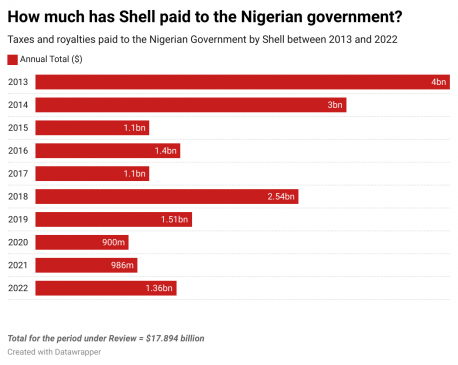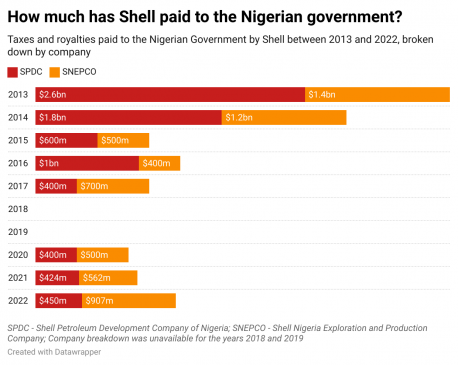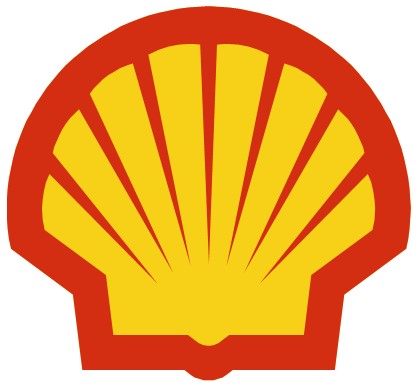By Emeka Ugwuanyi
Shell Companies in Nigeria (SCiN) – Shell Petroleum Development Company Limited (SPDC), Shell Nigeria Exploration and Production Company (SNEPCo) and Shell Nigeria Gas Limited (SNG) have paid at least US$39.718 billion to Nigerian government as production entitlements, taxes, royalties and fees in the past nine years.

These payments exclude funds allocated to social investments in various sectors of the Nigerian economy.
Findings by The Business Intelligence Africa (TBI Africa) magazine show that in the past nine years between 2014 and 2022, Shell Companies in Nigeria have paid the Nigerian government over US$39.718 billion as production entitlements, taxes, royalties and fees, underscoring the company’s avowed commitment to the growth and sustainability of the Nigerian economy. Shell had over time said it is in Nigeria for the long haul contrary to some media reports that the oil giant wants to leave Nigeria.
A breakdown of TBI Africa’s findings showed that in 2014, SCiN paid $3.02 billion; 2015 ($4.95 billion); 2016 ($3.64 billion); 2017 ($4.32 billion); 2018 ($6.397 billion); 2019 ($5.63 billion); 2020 ($3.24 billion); 2021 ($4.00 billion) and in 2022 ($4.521 billion).
 Also, taxes and royalties paid to Nigerian Government by the Shell Petroleum Development Company Limited (SPDC) and Shell Nigeria Exploration and Production Company (SNEPCo) in the past 10 years between 2013 and 2022, stood at a princely US$17.894 billion, according to TBI Africa research.
Also, taxes and royalties paid to Nigerian Government by the Shell Petroleum Development Company Limited (SPDC) and Shell Nigeria Exploration and Production Company (SNEPCo) in the past 10 years between 2013 and 2022, stood at a princely US$17.894 billion, according to TBI Africa research.
A breakdown of these payments showed that in 2013 SPDC and SNEPCo paid $4billion in the ratio of (SPDC $2.6billion) and (SNEPCo $1.4bn); while in 2014 it paid $3billion (SPDC $1.8billion) and (SNEPCo $1.2billion).
In 2015 the company paid $1.1billion (SPDC $0.6billion) and (SNEPCo $0.5billion); in 2016, it paid $1.4billion (SPDC $1billion) and (SNEPCo $0.4billion); in 2017, it paid $1.1billion (SPDC $0.4billion) and (SNEPCo $0.7billion); in 2018, it paid 2.539billion, while in 2019, it paid $1.509billion.
In 2020, it paid $0.9billion (SPDC $0.4billion) and (SNEPCo $0.5billion); in 2021, it paid $0.986billion (SPDC $0.424billion) and (SNEPCo $0.562billion); in 2022, it paid $1.36billion (SPDC $0.450billion) and (SNEPCo $0.907billion). Therefore, the total payments in taxes and royalties to Nigerian government in the past 10 years were US$17.894 billion.
In his highlights of 2022 activities as contained in Shell briefing notes, the Managing Director of the Shell Petroleum Development Company and Country Chair of Shell Companies in Nigeria, Mr. Osagie Okunbor, said: “Despite production challenges in 2022, the tenacity, commitment and resilience of our people enabled us to deliver some significant achievements and continue to power progress in Nigeria.
“For our businesses in Nigeria, 2022 was very much a year of two halves, with the first half proving especially difficult due to the production challenges outlined in these pages. Tragically, 2022 was also a year where our country experienced its worst flooding in recent history, with many lives lost and hundreds of thousands of people displaced from their homes.
“However, despite these headwinds, the tenacity, commitment and resilience of our people allowed us to turn a corner on several fronts, leading to optimism for the beginning of 2023.
“Crude theft is a serious threat to our country. Last year, we faced our biggest operational challenge in many years at SPDC, where a significant decline in crude receipts at the Bonny Oil and Gas Terminal resulted in our declaration of force majeure in March 2022. I am pleased to say that the force majeure on the Bonny export programme was lifted in March 2023.
“Unfortunately, along with other operators in Nigeria, SPDC continues to face the twin challenges of sabotage and crude oil theft, each of which not only deprives our country and our people of billions of dollars of tax revenue, but also endangers people’s lives. Sadly, we were reminded of these dangers in March 2023 when a fire incident occurred at the site of an illegal connection used for crude theft on the Rumuekpe – Nkpoku trunk line in Rivers state. The line was not operational at the time of the fatal incident.
“Crude theft poses a serious environmental risk that impacts not just oil and gas operations but also our communities. Our teams continue to collaborate with the Nigerian government and other stakeholders with the aim of eradicating crude theft from our facilities. There is cause for optimism, as these collaborations are starting to yield results through changes in approach. Together, we have also made progress in developing security systems that allow us to better monitor our facilities, and therefore detect and deter some of these illegal actions.”
Recall that Okunbor at a conference in Abuja said that Shell loses 44 per cent of oil it pumped into the Trans Niger Pipeline (TNP) before it gets to the terminal. “I can tell you that our most important pipeline in the Delta – the Trans Niger Pipeline (TNP) and the reconciliation factor, which is the difference between what you put into the pipe and what arrives at the terminal, the reconciliation factor is around 56 per cent, which means 44 per cent of what goes into that pipeline disappears.
“This is material not just for Shell but it is even more material for the country. As you know, 90 per cent or more of oil that is produced in JV goes back to this country either via taxes or royalties, among others. I’m talking about the net after cost, so this country bleeds a bit.”
Okunbor noted that the SNEPCo team members, most of whom he was proud to say are Nigerians delivered an outstanding milestone early in 2023. The Bonga FPSO, the country’s first deep-water exploration and production vessel, exported its one billionth barrel of oil – a fantastic achievement.
“In 2022 our country was profoundly impacted by severe flooding, which affected businesses and communities in several states. Shell responded by committing $1 million to support the government’s efforts to provide relief. Beyond that, our own staff raised more than 10 million Nigerian Naira for people most in need.
“Our commitment to Nigeria is not simply in response to such challenges, and in the factsheet of this report, you will find a summary of the revenue we generated for the government through taxes, the employment opportunities we created and the contributions we have made to developing local businesses.
“Between them, SPDC, SNEPCo and SNG spent $34.29 million in direct social investment during 2022. A further $56.13 million has been earmarked to be paid in 2023 by SPDC and SNEPCo as a statutory contribution to the Host Communities Development Trusts (HCDT) which will benefit our communities.
“While these HCDTs are one valuable outcome of the Petroleum Industry Act (PIA), we have always demonstrated resolute commitment to our communities, and we will continue to do so.
“In 2022, we worked on several projects including the completion of the final phase of our Oloibiri Health Programme in Bayelsa state which has helped over 18,000 patients since its launch. The integrated healthcare project, powered by a hybrid solar electrification system, provides access to a health campus, drug distribution centre and an infant care programme.
“I am similarly proud of the incredible work that we do to support entrepreneurship and education. SPDC, SNEPCo and SNG funded more than $5.6 million in academic scholarships in 2022, investments that are critical to the country’s development. Many of these programmes’ previous beneficiaries have gone on to become today’s business and political leaders in Nigeria. In tandem, we continue to improve opportunities for young Nigerians to achieve their ambitions through the Shell LiveWIRE youth programme, providing training in enterprise development and management, as well as business start-up grants.
“All On – the impact investment company we established in 2016 – continues to go from strength to strength, backed by $200 million of seed funding provided by Shell. By the end of 2022, All On had committed a total of $23.6 million to a portfolio of 46 renewable energy companies. By doing so, it is increasing access to commercial renewable energy products and services for the under-served, and indeed the completely unserved off-grid energy markets, with a special focus on those in the Niger Delta.
“We are inspired by the possibilities that exist for developing new gas distribution solutions. SNG continues to provide gas to both business and domestic customers in Nigeria. Meanwhile, Shell’s acquisition in December 2022 of Daystar Power, an integrated solar power provider in West Africa, is well aligned with our strategy of delivering more and cleaner energy.
“SPDC also took further actions on existing gas projects, such as drilling additional wells to restore supply capacity to meet its commitment to NLNG and build additional contingency margin. Additional projects are planned for 2023 to build further resilience in supply capacity.
“I am also pleased that once again Shell Companies in Nigeria and our staff have been recognised with a number of awards during 2022. To name just three, we have received accolades as Best International Company of the Year (Petroleum Technology Association of Nigeria), Upstream Company of the Year (Nigeria International Energy Summit) and Leading Tax Compliant Firm in Nigeria (Federal Inland Revenue Service).
“Shell Companies in Nigeria have significantly contributed to Nigeria’s economy and its communities for over six decades. We believe strongly in the talents, capacity and culture of the Nigerian people. Going forward we will continue that collaboration, working together to power progress in Nigeria.”


previous post


